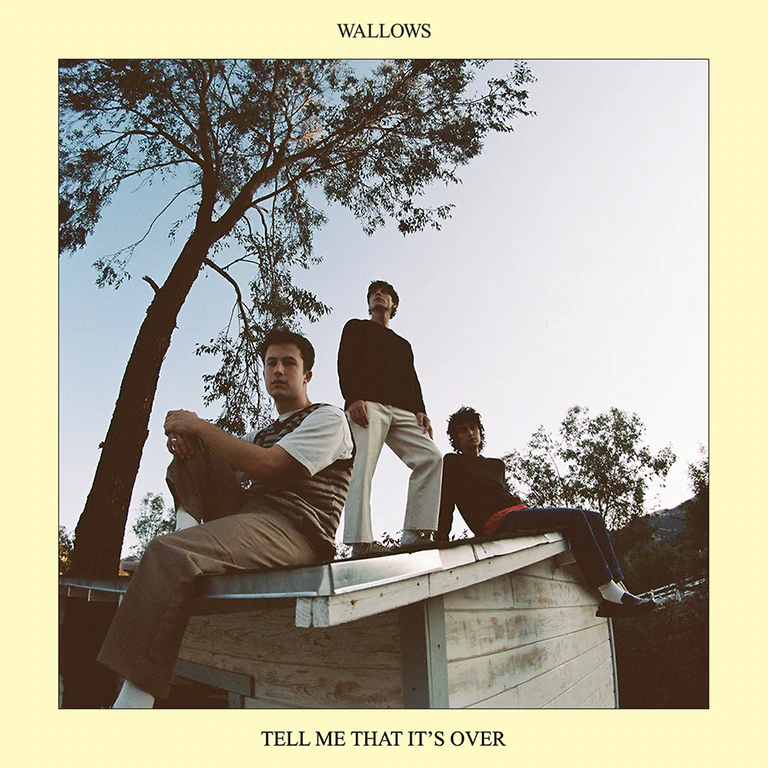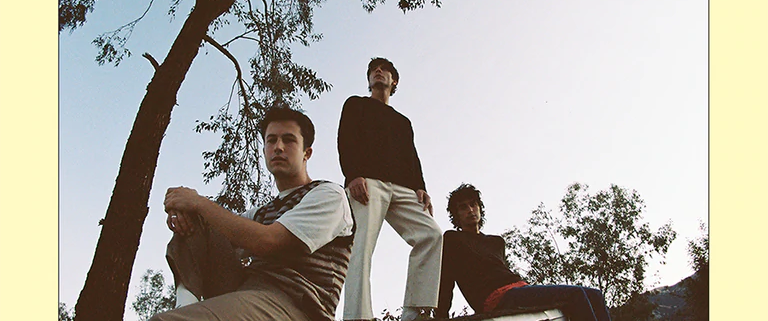Wallows takes on indie boy heartbreak in “Tell Me That It’s Over”

In the early 2000s, the emergence of indie alternative rock was sparked by bands like The Strokes and The White Stripes. The rules to play were simple: guitar, drums, bass, keys and an, often male, guttural singing voice. Sing of heartbreak, new love or something mildly controversial. Play sold out shows. Sell cool T-shirts.
But since the birth of this genre in America over 20 years ago, we’re now looking at a much different musical landscape. Genres from Katy Perry-pop to Chainsmokers-EDM have faded in and out. How have alternative rock bands been able to stay relevant, even successful?
Enter Wallows. The trio, which formed in 2011 and started releasing music in 2017, lead the genre in a new music streaming world. And with the drop of their second studio breakup album, “Tell Me That It’s Over,” the group has declared that they’re here to stay.
“Tell Me That It’s Over” is heartbreak through the hexagonal sunglasses of an indie boy. The album’s theme is simple: We are young; we are falling in and out of love; are we missing out on something greater we should explore alone? It’s early-20-something romantic existentialism in a pair of Converse sneakers.
The first thing to note is their ability to keep fundamental elements of their alt-rock predecessors while utilizing modern music technology to keep their sound fresh. Intro track “Hard To Believe” juxtaposes crunchy guitar breaks with ethereal bass and chimed trilling to symbolize the casual chaos of heartbreak. During a first listen, it’s impossible to know quite where the song is going next sonically — it kicks everything off with a thrill of anticipation.
It certainly sets the tone for the rest of the album, which draws upon similar elements to demonstrate innovation in their sound. “I Don’t Want to Talk,” the first single released ahead of the album, sets multiple stages throughout the track by adding constant sonic variance from verse to verse — arpeggiated synths, reversed drum noises, even a harmonica. Still, it makes you feel like a teenager in the ’90s jumping around in your bedroom. “Missing Out” is an emotional, heavy rock guitar anthem about letting love go (think the last hug before breaking up). However, it’s able to evoke emotion through an ethereal build up in the postchorus — another example of a successful marriage between classic and modern styles.
Others stray further away from the classic indie alt sound. Second single and third track “Especially You” is boxy, abstract and colorful. Its sonic layers, in all its crunchy and synthetic glory, are almost custom built to fit into the grooves of your brain. With computer glitching noises and vocal melodies reminiscent of playground taunting, it’s a nostalgic and easy listen. Third single “At the End of the Day” feels like an ’80s slow dance anthem, layering bouncing synths with ringtone-esque guitar picking that build into a full rollicking chorus. “Marvelous” immerses you into a fleeting thought of longing against the backdrop of a bustling crowd, boasting of fast-paced melodies and even trumpeteers toward the back end of the song.
Topically, the album does get a little repetitive and cliche. The “I can’t get you off my mind” and “You pushed me away” can feel a bit indie boy whiny at times. Additionally, it remains glaringly clear that Wallows’ strengths don’t lie in singing prowess, as the majority of their melodies stay in a vocal safe zone. And, the vocals of Lydia Night in “Permanent Price” add a twinkling refreshment to the album, but they stick out slightly compared to previous collaborations with feminine vocals (Remi Wolf on “OK” or Clairo on “Are You Bored Yet?”).
But, where Wallows excels is their ability to successfully combine classic alt-rock elements with modern music technology to create a unique, immersive atmosphere in their music. Especially in the album’s final track, “Guitar Romantic Search Adventure,” the dreamy instrumental breaks truly feel like soaring into the pink sunset clouds of postbreakup optimism. Each song stands alone in its own right, and somehow still blends together to set the universe of “Tell Me That It’s Over:” glittering stars, scuffed painted sneakers, opening the windows of an ancient Toyota Camry, blasting music with your friends while overlooking a sparkling city.
In demonstrating their promising ability to innovate and world-build in “Tell Me That It’s Over,” it’s evident that Wallows is only just getting started.

